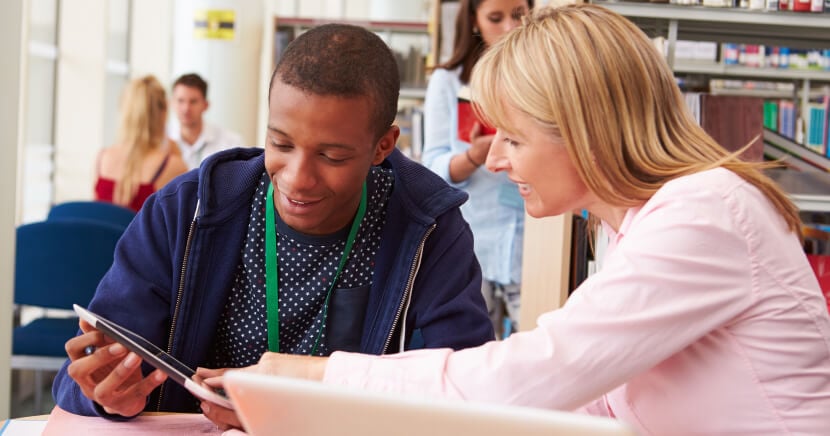Through the tools and services they offer their users and the expertise of their staff, today's academic libraries are invested in student success — or at least that's how librarians themselves see it. Students' perceptions, on the other hand, may vary.
In a 2021 survey, academic publisher SAGE asked library professionals if they agreed or disagreed with the following statement: “The mission of the library is not about buildings and collections, but who librarians serve.” Perhaps unsurprisingly, the majority (75%) agreed.
However, a new follow-up report, based on a survey of undergraduate students in the US, Canada and the UK, suggests that there is “a disconnect between the librarians’ perception of themselves and the library in general and the student perception”.
See also:
-
How digital information technology has helped academic libraries survive
-
How academic librarians can open a window onto a world of information
-
How technology has changed education in academic institutions
The 2023 SAGE report, titled "Librarian Futures Part II: The Knowledge Gap Between Librarians and Students", notes: "Encouragingly, when asked how the library supports their studies, relatively few students (5% of respondents) reported that the library has no role in supporting their studies.
More concerning, however, is that only 34% of students reported that librarians help them find resources, and only 24% reported that librarians taught them about resources."
When the researchers asked the undergraduates to list each of the ways they find resources for their assignments and studies, 63% said "I Google stuff", while 35% said “I go to the library website” and 27% reported “I go to the library building.”
How librarians contribute to student success

For the academic library to play a key role in student success, library staff must find new ways to engage students and increase awareness of the library services and resources available to them.
In addition to providing access to research and study materials, library staff at higher-education institutions offer a wealth of knowledge and expertise that can help students navigate the complex world of research and information-gathering.
Here are some ways academic librarians can contribute to student success:
1. Research assistance
To contribute to students' academic success — and live up to the ideal of the campus library as a user-focused institution and not just a collection of resources — academic libraries have been evolving. By adopting new information and communication technology, library professionals open up opportunities to learn new skills and move into different roles, including that of research support.
Librarians can provide guidance on research topics, suggest search strategies, and offer help with citation-management software. They can also help students navigate databases, e-journals and other electronic resources — including digital news platforms such as PressReader.
2. Collection development
Staff at university, college and research libraries are responsible for developing and maintaining the library's collection of books, academic journals and other materials.
By keeping the collection up-to-date and finding materials relevant to student learning, librarians can help ensure that students have access to the tools they need to succeed.
3. Information literacy instruction

According to the Association of College and Research Libraries, information literacy is "the set of integrated abilities encompassing the reflective discovery of information, the understanding of how information is produced and valued, and the use of information in creating new knowledge and participating ethically in communities of learning."
Much like media literacy, information literacy empowers people to learn for themselves so that they can make more informed decisions. It helps them recognize biases, understand context, and evaluate information so they can effectively use and communicate it.
It’s a lifelong skill set that meaningfully impacts every person’s education, career, civic involvement and personal life.
In the context of higher education, academic libraries can provide instruction in information literacy to students, helping them develop the skills they need to find and evaluate information effectively. This can include workshops, online tutorials or one-on-one consultations.
4. Collaboration with faculty

As the 2020 book Technology, Change and the Academic Library (edited by UK-based library and information services consultant Jeremy Atkinson) notes, some academic libraries may be resistant to new technologies due to an ingrained tendency toward preserving the status quo.
Because this can make it difficult to implement new innovations that require flexibility and creativity, collaboration with academic and support staff across other areas of the university is key.
“Collaborative approaches bring together a wider range of expertise, knowledge and different ways of thinking,” Atkinson’s book states. They also create an environment in which risk, innovation and experimentation are encouraged.
Academic librarians can collaborate with faculty to develop assignments and course materials that promote information literacy and research skills. By forming these partnerships and working together, university librarians and faculty can help ensure that students have the resources and support they need to succeed in their coursework.
5. Outreach and engagement
In a 2021 article published in The Chronicle of Higher Education, senior writer Scott Carlson noted that in coming years libraries at colleges and universities will likely emphasize the value of their digital information technology and related resources and services.
This, Carlson suggests, will also compel library staff to do more to engage users. “Libraries need far more-aggressive outreach programs to patrons and more careful curation of digital collections and e-resources, just to keep the library’s expertise and resources in front of students and researchers.”
Librarians can engage with students through outreach activities such as orientation sessions and workshops, and by interacting with them on social media. By building relationships with students, library staff can help them feel comfortable seeking help and support when they need it.
Engagement is a key factor in student success

One way to boost patron engagement is to enable academic library users — not just students, but faculty and staff as well — to access library materials and services even when they are not on campus.
In the Chronicle of Higher Education article mentioned above, Carlson wrote that librarians noticed that as they moved more materials and services online, students and professors increased their involvement in library activities.
Carlson cited Susan Goodwin, associate dean for user services at Texas A&M University at College Station. She noted that the COVID-19 pandemic was something of a tipping point. According to Goodwin, responding to that crisis gave library staff a chance to rethink the library’s processes and priorities.
Before the pandemic, she said, librarians were already engaged in persuading instructors to shift their course materials to more widely available online educational resources. When COVID hit, she said, it “only strengthened our resolve to continue to get the word out.”
Helping students stay informed
At academic libraries that offer PressReader, keeping students and other users informed about what’s happening at the library is simple thanks to the Self-Pub feature.
In just a few easy steps, staff can digitize and upload the library’s own collateral right to the front page of PressReader to engage patrons with newsletters, event announcements, info about library programs, and pointers on finding academic journals and other research materials.
In order for students to make the best possible use of are to make the most of what's available to them within the libraries of their own institutions, they must first be made aware of those resources. It's just one way that the academic library can play a key role in student success.









